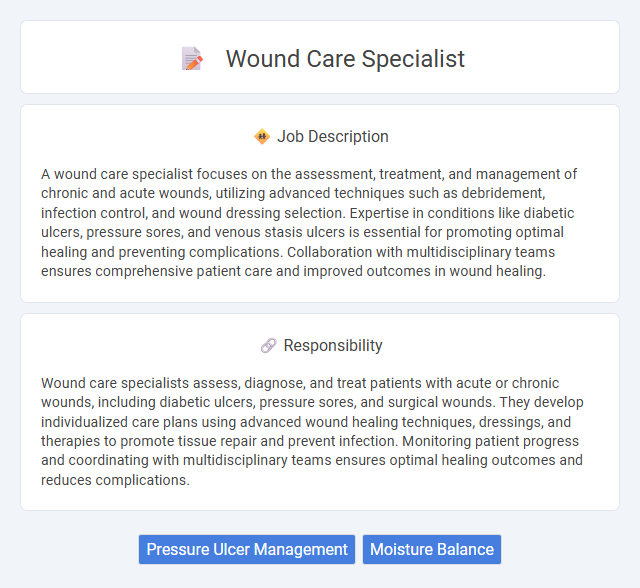
A wound care specialist focuses on the assessment, treatment, and management of chronic and acute wounds, utilizing advanced techniques such as debridement, infection control, and wound dressing selection. Expertise in conditions like diabetic ulcers, pressure sores, and venous stasis ulcers is essential for promoting optimal healing and preventing complications. Collaboration with multidisciplinary teams ensures comprehensive patient care and improved outcomes in wound healing.
Wound care specialists are likely well-suited for individuals who demonstrate strong attention to detail, empathy, and patience, as the role involves managing complex wounds and providing patient-centered care. People who are physically capable of standing for extended periods and handling medical equipment may find this career a good fit, while those with a resistance to clinical environments or who struggle with high-stress situations might find it less suitable. A background in nursing or related healthcare fields probably enhances compatibility with this profession, given the technical knowledge required.
Qualification
A wound care specialist typically holds a nursing degree, such as an RN or LPN, and often pursues advanced certifications like the Certified Wound Care Nurse (CWCN) or Wound Care Certified (WCC) credentials. Extensive knowledge of wound healing processes, infection control, and patient assessment is essential, often gained through clinical experience in surgical, dermatology, or rehabilitation settings. Proficiency in using specialized wound care technologies and treatment protocols ensures optimal patient outcomes and compliance with healthcare standards.
Responsibility
Wound care specialists assess, diagnose, and treat patients with acute or chronic wounds, including diabetic ulcers, pressure sores, and surgical wounds. They develop individualized care plans using advanced wound healing techniques, dressings, and therapies to promote tissue repair and prevent infection. Monitoring patient progress and coordinating with multidisciplinary teams ensures optimal healing outcomes and reduces complications.
Benefit
Wound care specialists are likely to experience significant professional fulfillment due to the critical role they play in improving patient recovery and preventing complications. Employment in this field may offer competitive salaries along with opportunities for career advancement in healthcare settings. Access to ongoing education and specialized training could enhance job security and expertise, making this profession a promising choice for those interested in patient-centered care.
Challenge
Wound care specialists likely face the challenge of managing complex and chronic wounds that require precise assessment and tailored treatment plans. The probability of encountering patients with varying underlying conditions such as diabetes or vascular diseases may complicate healing processes. Maintaining up-to-date knowledge on advanced wound care technologies and infection control methods could also pose an ongoing challenge.
Career Advancement
Wound care specialists play a crucial role in managing chronic wounds and improving patient outcomes through advanced treatments and technologies. Career advancement opportunities include obtaining certifications such as Certified Wound Care Specialist (CWCS) or becoming a Wound Care Nurse Practitioner, which enhance clinical skills and increase leadership responsibilities. Pursuing specialized training and gaining experience in wound care research or education can lead to positions in healthcare administration or academic roles.
Key Terms
Pressure Ulcer Management
Wound care specialists play a critical role in pressure ulcer management by assessing tissue damage, designing customized treatment plans, and implementing advanced wound care techniques such as debridement and negative pressure therapy. They use evidence-based protocols to prevent infection, promote healing, and reduce patient discomfort while collaborating with multidisciplinary teams to ensure comprehensive care. Expertise in pressure ulcer staging, moisture balance, and nutritional support significantly improves patient outcomes and accelerates recovery timelines.
Moisture Balance
Wound care specialists play a critical role in maintaining optimal moisture balance to promote faster healing and prevent infection. They utilize advanced dressings and techniques to ensure wounds stay adequately moist without becoming overly saturated, which supports tissue regeneration and reduces the risk of maceration. Expertise in moisture balance management enables these professionals to customize treatment plans that improve patient outcomes and reduce complications.
 kuljobs.com
kuljobs.com